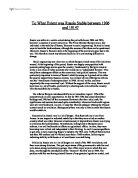To what extent did Russia undergo economic and political reform in the years 1906-14?
To what extent did Russia undergo economic and political reform in the years 1906-14?
After the 1905 revolution Russia was in need of reforms both economically and politically, to allow it maintain its role of a great power and to prevent another revolution occurring the answer to this was the October Manifesto. However, due to the stubbornness of the Tsar who was determined not to relinquish his autocratic powers, what may have appeared as reforms were largely superficial making little change in particular to the Russian political system.
In early 1906 the October Manifesto was published as a result of the 1905 revolution and as a way to appease the peasants and appear as a revolutionary change, when truly very little was changed by this. Political activity was now legal so political parties now no longer needed to remain secrets; freedom of speech was also introduced along with the introduction of a state elected Duma. Most of these changes were made as a bid to make the peasants content and prevent the chances of another revolution; however this also banned trade unions and newspapers. The introduction of the first Duma was short lived due to the passing of the fundamental laws, these gave the Tsar power to dissolve the Duma at any point and take back full autocratic power in a crisis or time of war. Thereby, hampering any political reform that was going to be made in this period. This was also employed by the Tsar to dissolve the second Duma, mainly due to a high percentage of liberals and extremists that had been elected to these which the Tsar saw as a threat to him and his power. This was immediately unpopular with the Russian people as it had shown the superficial nature of the October Manifesto reforms and how despite promising reform little had really changed, the Tsar then implemented martial law within the major cities to quell the civil unrest making a return to how Russia was ruled before the revolution. However, with the opening of the third Duma began real cooperation between the Duma and Tsar resulting in social reforms being passed improving areas such as education. Although the reason for this cooperation may have been somewhat due to the changes in the electoral system by Stolypin, restricting who could vote. Eventually, the fourth Duma began to increase the power it held and actually made criticisms of government policies showing a distinct change in attitude between the first and fourth Dumas role in Russia and that reform had actually been made by them.








